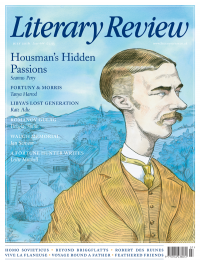Peter Marshall
Varying the Diet
All Things Made New: Writings on the Reformation
By Diarmaid MacCulloch
Allen Lane 450pp £25
Diarmaid MacCulloch is one of our very best public historians: a charismatic telly don who has served his time in the academic trenches and is, as this collection triumphantly confirms, able to write authoritatively and engagingly on a remarkably diverse range of topics in the history of Christian culture and thought. The unifying theme is formally the Reformation, or Reformations – British and European, Protestant and Catholic – on which MacCulloch is an acknowledged expert. In fact, what lends cohesion to this highly eclectic selection of reprinted book reviews, essays, detailed research articles and broad historiographical surveys is MacCulloch’s admirably unfashionable belief that the writing of history has a ‘moral purpose’: to prevent ‘societies and institutions collectively going insane as a result of telling themselves badly skewed stories about the past’.
In other words, MacCulloch is in the myth-busting business – with a specific remit to puncture the convictions of a particular kind of modern Christian believer, and to expose the shaky foundations underlying a great deal of what he is not abashed to call ‘the bleak certainties and bullying self-righteousness of much organized religion’. His historical heroes are the persecuted, the marginalised and the vacillators – into which categories (though he managed to undertake a little light persecution himself) falls Thomas Cranmer, the executed archbishop of Canterbury, a biography of whom made MacCulloch’s reputation as a historian. One of the contributions here is an intriguingly self-reflective piece on the writing of that book.
It is fair to say that Rome and the popes who established it as the executive headquarters of Western Christianity do not fare well in MacCulloch’s version of things. The increasing dominance of the papacy, after the initial Christian centuries, was not only an accident but also an error: ‘It

Sign Up to our newsletter
Receive free articles, highlights from the archive, news, details of prizes, and much more.@Lit_Review
Follow Literary Review on Twitter
Twitter Feed
Though Jean-Michel Basquiat was a sensation in his lifetime, it was thirty years after his death that one of his pieces fetched a record price of $110.5 million.
Stephen Smith explores the artist's starry afterlife.
Stephen Smith - Paint Fast, Die Young
Stephen Smith: Paint Fast, Die Young - Jean-Michel Basquiat: The Making of an Icon by Doug Woodham
literaryreview.co.uk
15th-century news transmission was a slow business, reliant on horses and ships. As the centuries passed, though, mass newspapers and faster transport sped things up.
John Adamson examines how this evolution changed Europe.
John Adamson - Hold the Front Page
John Adamson: Hold the Front Page - The Great Exchange: Making the News in Early Modern Europe by Joad Raymond Wren
literaryreview.co.uk
"Every page of "Killing the Dead" bursts with fresh insights and deliciously gory details. And, like all the best vampires, it’ll come back to haunt you long after you think you’re done."
✍️My review of John Blair's new book for @Lit_Review
Alexander Lee - Dead Men Walking
Alexander Lee: Dead Men Walking - Killing the Dead: Vampire Epidemics from Mesopotamia to the New World by John Blair
literaryreview.co.uk